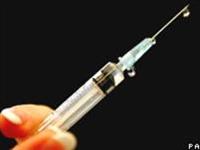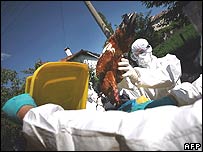 |
|
Many pharmaceutical companies have participated in vaccine research (Photo: PA) |
This vaccine has shown effectiveness in trials using two doses of 3.8 micrograms, and Glaxo emphasizes that the precise dosage is crucial.
Companies aim to use the smallest possible doses to maximize the number of doses produced.
Although Glaxo has not yet publicly released the trial results, the company states that countries can place orders for the vaccine as early as now to receive shipments by early 2007. One of Glaxo’s competitors, the French company Sanofi Aventis, is also working on developing a vaccine.
A study published in The Lancet in May indicated that Sanofi’s vaccine proved effective when administered in two doses of 7.5 micrograms.
Another company, Baxter International, has received an order for two million doses of the vaccine from the UK’s health authorities to supply to government employees.
Concerns About a Pandemic
The most significant concern currently is that the H5N1 virus may combine with another disease-causing virus and mutate into a strain that can be transmitted from person to person.
Since 2003, there have been 231 reported human cases of bird flu, with 133 fatalities among those infected.
However, no human-transmissible strain of the avian influenza virus has been identified, and since no one knows what this potential strain would look like, it is challenging to create a targeted vaccine.
 |
| Avian influenza spreads across many countries (Photo: AFP) |
Nevertheless, some companies, including Glaxo, are working on developing a vaccine based on the currently existing H5N1 strain, as any solution is better than none. Glaxo has stated that it will begin discussions with governments about whether they wish to place vaccine orders and how many they would like to order.
Glaxo’s vaccine is currently on the priority list for regulatory approval from European and U.S. drug agencies. The company has received $272 million from the U.S. to research and develop the vaccine.
Many Questions Remain
However, there are still many issues that need to be resolved before the pandemic vaccine can be released to the market.
First, it is unclear how many doses Glaxo can produce right away, and the challenges involved in moving from laboratory trials to mass production.
Secondly, it is still unknown whether this vaccine will remain effective if the H5N1 virus mutates.
Glaxo is confident that its vaccine will still be effective against slightly mutated virus strains. The company also indicated that the price of the vaccine will be higher than that of the standard flu vaccine, approximately £4 per dose.
According to Glaxo, the side effects of the avian flu vaccine are similar to those experienced with standard influenza treatments, primarily resulting in high fever in some patients.
Glaxo acquired the Canadian vaccine manufacturing company ID Biomedical for $2 billion last year and is now the second-largest vaccine manufacturer globally, following Sanofi.


















































